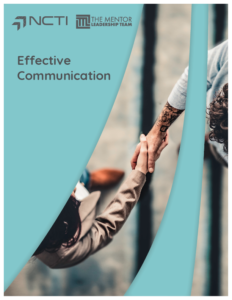Delivery: Online | Est. Length: 4 Seat Hours | Price: $200.00

Course Overview
The NCTI Empowering Communication and Healthy Conflict course teaches that communication is more than just exchanging information—it is the tool leaders use to affirm and empower their teams.
Effective leaders do not shy away from conflict; they manage it. This course helps students master both verbal and non-verbal communication while developing Active Listening skills. You will learn to identify the difference between healthy debate and toxic arguments, using the CLEAR Conversations Framework to navigate difficult discussions with confidence.
Includes Digital Toolkit:
- Learner Workbook (PDF): Contains thought-provoking exercises to make the training personal and immediately applicable.
- Case Studies: Real-world scenarios to practice turning conflict into a learning experience.
Who Should Attend:
- Emerging Leaders
- Supervisors and Managers
- Team Leads wanting to improve culture
What You Will Learn
Upon completion, students will be able to maximize their influence by proactively promoting healthy conflict and resolving disputes before they become toxic.
Core Competencies:
- Conflict Identification: Distinguish between healthy and unhealthy conflict, recognizing the characteristics and effects of each on the workplace.
- The CLEAR Framework: Apply the CLEAR Conversations model to structure meaningful, difficult discussions without avoidance.
- Resolution Strategies: Identify personal “hot buttons,” manage interpersonal differences, and utilize calmer thinking to de-escalate tension.
- Proactive Leadership: Create a learning culture by establishing clear expectations, separating “Role vs. Identity,” and modeling healthy behavior for the team.
- Empowerment: Use communication not just to direct, but to energize and connect people through a compelling vision.
Certification and Benefits
Become an Emerging Leader
This course is a key component of your professional development, offering credit toward the NCTI Emerging Leader certification.
Additional Benefits:
- Industry Recognition: Receive the NCTI Certificate of Graduation.
- Immediate Application: The included workbook exercises allow you to apply conflict management skills to your current team dynamic immediately.
- Culture Building: Learn to foster a collaborative style where diverse perspectives are valued, not silenced.
Course Outline
Module 1: Healthy Conflict Management
- The importance of healthy conflict vs. toxic arguments.
- Identifying unhealthy conflict early.
Module 2: Styles and Reactions
- Effects of unhealthy conflict at work.
- Understanding conflict styles (Collaborative vs. Avoidant).
- Reactions to conflict and corrective feedback.
Module 3: CLEAR Conversations
- The CLEAR Framework for meaningful conversations.
- Why we avoid difficult conversations and why they are necessary.
Module 4: Resolving Conflict
- Identifying personal “hot buttons.”
- Respect and calmer thinking strategies.
- Role vs. Identity: You are not your job title.
Module 5: Proactive Leadership
- Discipline and accountability.
- Creating a learning culture and remaining open to perspectives.
- Energizing the team through a compelling vision.
- Case studies and practical application.
